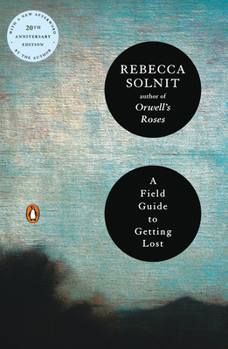A Field Guide to Getting Lost
Select Format
Select Condition 
Book Overview
"An intriguing amalgam of personal memoir, philosophical speculation, natural lore, cultural history, and art criticism." --Los Angeles Times From the award-winning author of Orwell's Roses, a stimulating exploration of wandering, being lost, and the uses of the unknown Written as a series of autobiographical essays, A Field Guide to Getting Lost draws on emblematic moments and relationships in Rebecca Solnit's life to explore issues of uncertainty, trust, loss, memory, desire, and place. Solnit is interested in the stories we use to navigate our way through the world, and the places we traverse, from wilderness to cities, in finding ourselves, or losing ourselves. While deeply personal, her own stories link up to larger stories, from captivity narratives of early Americans to the use of the color blue in Renaissance painting, not to mention encounters with tortoises, monks, punk rockers, mountains, deserts, and the movie Vertigo. The result is a distinctive, stimulating voyage of discovery.
Format:Paperback
Language:English
ISBN:0143037242
ISBN13:9780143037248
Release Date:June 2006
Publisher:Penguin Books
Length:224 Pages
Weight:0.68 lbs.
Dimensions:0.7" x 5.4" x 8.3"
Age Range:18 years and up
Grade Range:Postsecondary and higher
Customer Reviews
5 ratings
Solnit is insightful
Published by Thriftbooks.com User , 17 years ago
Rebecca Solnit has created what is in my mind what we all seek. Peace. In the notion of accepting that we are all "Lost", and that is where we are meant to be she has captured what the human condition is. Her prose is exceptional and thick. Her attachment to the natural world is a beacon of light in a society that is truly hopelessly lost. Lost from what is real. Brilliant work Ken Wylie Calgary Canada
Reigning Queen of the Essay.
Published by Thriftbooks.com User , 17 years ago
With a prodigious breadth and fearless depth, she takes the segue to a high art. Anything can be the occasion for connection. Any sentence can break your mind or heart wide open. Her most personal, and my personal favorite. Reading this book makes me feel alive.
Rationality and Mystery
Published by Thriftbooks.com User , 18 years ago
The first question is, what is a field guide to getting lost? Field guides help us with finding, not losing or getting lost. We use them to classify the unfamiliar and figure out what surrounds us. They reassure us that the bewildering array of natural phenomena has an underlying order. Solnit's title suggests we might also want our schemas to break down. Can we catalogue the various ways of getting lost as we might catalogue songbirds? The paradox feels whimsical, mocking, alluring. Like the title, the tone of the book will hover between the urge to know and the urge not to know, between rationality and mystery. In the middle of the first chapter, Solnit gives us a manifesto: "Never to get lost is not to live, not to know how to get lost brings you to destruction." "Lost," for her, means we lack a narrative for what we are experiencing. Getting lost is a kind of Zen rebirth because "to be lost is to be fully present, and to be fully present is to be capable of being in uncertainty." Getting lost also has connotations of spiritual longing. Solnit titles every other chapter "The Blue of Distance." Blue "represents the spirit, the sky, and water, the immaterial and the remote, so that however tactile ansd close-up it is, it is always about distance and disembodiment." Voila the tone of the book--grand, abstract, sensual, yearning and inexorably aloof. With a topic like the beauty of longing and loss, it is surprising how rarely Solnit lapses into cliché. Her prose is as smooth and bare as polished stone. It creates the feeling of waking from a dream and encountering the world, dazed and receptive. If Thoreau is the most cerebral of the philosopher-poets and Whitman the most sensual, Rebecca Solnit belongs at the midpoint. She does not allow herself academic verbal tics, or excess verbiage, but neither does she shy away from the syntactical complexity of acadmic writing. She integrates lyric sensuality and philosophizing as if these modes belong together, as if western civilization had never tried to separate mind and body. I admire her poise and authority a little as I admire Susan Sontag's. Solnit's is a supremely self-possessed voice, which may be the same thing as a voice that has abandoned the antic whining of the self. She draws deeply on experience, yet she resists the confessional mode. You might say that Solnit offers an optimistic way to confront the globalized, alienated world of the twenty-first century, a sort of "If God gives you lemons, make lemonade," or "If God gets you lost, revel in it." You could argue that she offers a sophisticated alternative to the self-help genre, though I imagine Solnit would look down on self-help. She likes slipperiness and paradox too much. Still, she is interested in finding a way forward for the soul, and I, for one, am glad because my little soul is often bewildered. I think Solnit dances between lostness and foundness. She notes that "nomads have fixed circuits and stable relationships to pla
Connections, ancestry, history, and modern culture in a personal odyssey of exploration
Published by Thriftbooks.com User , 20 years ago
Rebecca Solnit's A Field Guide To Getting Lost discusses experience and getting lost in the everyday, examining how people move from cities to wilderness, how they search for sense of self in an uncertain life, and how her own explorations in the world have changed her life. At once an autobiography and introspective examination, A Field Guide To Getting Lost surveys connections, ancestry, history, and modern culture in a personal odyssey of exploration.
Gem of 2005
Published by Thriftbooks.com User , 20 years ago
Solnit's book is as the title suggests--a discursive reflectoin on the many nuances of the idea of 'getting lost.' You find out that 'lost' is from the Norse meaning 'the dispersal of armies,' and that early Renaissance painters use blue to designate distance, that children are better (i.e., less likely to die) at getting lost because they don't rationalize the way adults do--all in just a few pages where the insight garnered is both spun out by the author, but left to the reader to stop and pursue in his/her own reflections. Of the twenty or so books of all genres which I've read in the last few weeks--and of those I will read in the next several I suspect--this book incarnates why I read: erudite, entertaining, entrancing. Solnit's book reaches out toward Wordsworth, Dillard, Thoreau--and the Clash, Plato, Robert Hass. The voice and perspective, though, are her own. The essays here can not be read in great, long gulps; switching metaphors, there is hearty sustenance here--you take in only so much, and you are sated with good things which you must digest before moving on. Side note: whoever edited the book did a disservice--occasional glaring errors, such as 'form' being spelled out 'from' and 'good' repeated a second time in a context where the repetition makes no sense (and when you know the author would have easily used another expression to capture the nuance intended over against using something as clunky as redundancy of such a limited word).
A Field Guide to Getting Lost Mentions in Our Blog

Travel the World for Just a Few Bucks With Books!
Published by Ashly Moore Sheldon • May 29, 2019
Travel has been the subject of many a great book. Here are a few that we've loved.






